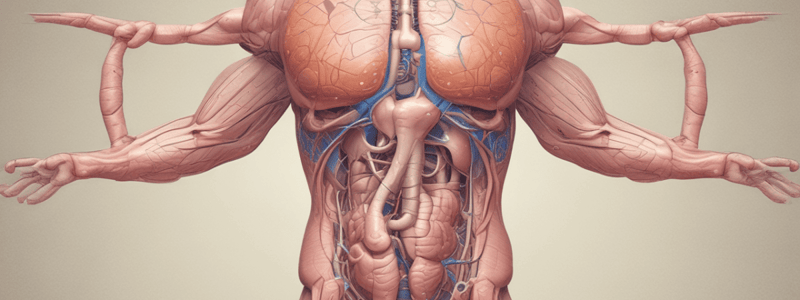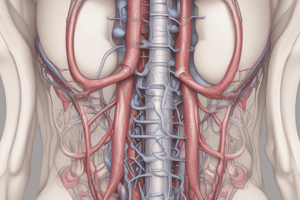Podcast
Questions and Answers
What is the primary function of Sertoli cells in the seminiferous tubules?
What is the primary function of Sertoli cells in the seminiferous tubules?
- Phagocytosis of excess cytoplasm during spermatogenesis (correct)
- Removal of residual bodies from the spermatozoa
- Secretion of inhibin and MIS
- Production of testosterone for spermatogenesis
Which type of epithelium lines the tubuli recti?
Which type of epithelium lines the tubuli recti?
- Cuboidal epithelium (correct)
- Stratified squamous epithelium
- Simple squamous epithelium
- Columnar epithelium
What is the main function of principal cells in the epididymis?
What is the main function of principal cells in the epididymis?
- Removing most of the water entering the epididymis (correct)
- Producing testosterone for spermatogenesis
- Releasing axonemes and vesicles through apocrine secretion
- Phagocytosing excess cytoplasm during spermatogenesis
What is the histological structure of the vas deferens?
What is the histological structure of the vas deferens?
What percentage of semen volume is produced by the seminal vesicles?
What percentage of semen volume is produced by the seminal vesicles?
What is the primary component of the secretion produced by the prostate gland?
What is the primary component of the secretion produced by the prostate gland?
What is the function of corpora amylacea in the prostate gland?
What is the function of corpora amylacea in the prostate gland?
What type of epithelium lines the bulbourethral gland?
What type of epithelium lines the bulbourethral gland?
What is the function of the ductuli efferentes?
What is the function of the ductuli efferentes?
What is the main component of the secretion produced by the seminal vesicles?
What is the main component of the secretion produced by the seminal vesicles?
What is the primary function of the testes in the male reproductive system?
What is the primary function of the testes in the male reproductive system?
What is the name of the dense connective tissue that surrounds the testis?
What is the name of the dense connective tissue that surrounds the testis?
What is the purpose of the pampiniform venous plexus in the male reproductive system?
What is the purpose of the pampiniform venous plexus in the male reproductive system?
What is the name of the muscular layers that allow for movement of the testes and help regulate testicular temperature?
What is the name of the muscular layers that allow for movement of the testes and help regulate testicular temperature?
What is the role of the mediastinum testis in the male reproductive system?
What is the role of the mediastinum testis in the male reproductive system?
What is the optimal temperature required for sperm production in the male reproductive system?
What is the optimal temperature required for sperm production in the male reproductive system?
What is the name of the glands that produce secretions required for sperm activity in the male reproductive system?
What is the name of the glands that produce secretions required for sperm activity in the male reproductive system?
What is the role of Leydig cells in the male reproductive system?
What is the role of Leydig cells in the male reproductive system?
Which type of cell is responsible for producing testosterone?
Which type of cell is responsible for producing testosterone?
What is the purpose of the tunica vaginalis in the male reproductive system?
What is the purpose of the tunica vaginalis in the male reproductive system?
What is the name of the tubes where sperm production occurs in the male reproductive system?
What is the name of the tubes where sperm production occurs in the male reproductive system?
What is the process by which spermatozoa are produced in the seminiferous tubules?
What is the process by which spermatozoa are produced in the seminiferous tubules?
What is the function of Sertoli cells in the seminiferous tubules?
What is the function of Sertoli cells in the seminiferous tubules?
What is the primary function of the blood-testis barrier?
What is the primary function of the blood-testis barrier?
What is the phase of spermatogenesis during which spermatids are formed?
What is the phase of spermatogenesis during which spermatids are formed?
What is the function of the golgi apparatus in spermatids during spermiogenesis?
What is the function of the golgi apparatus in spermatids during spermiogenesis?
What is the type of cell that undergoes mitosis and gives rise to type A spermatogonia cells?
What is the type of cell that undergoes mitosis and gives rise to type A spermatogonia cells?
What is the function of the centrioles in spermatids during spermiogenesis?
What is the function of the centrioles in spermatids during spermiogenesis?
What is the type of junction that forms the blood-testis barrier?
What is the type of junction that forms the blood-testis barrier?
What is the final step of spermiogenesis?
What is the final step of spermiogenesis?
Flashcards are hidden until you start studying
Study Notes
Male Reproductive System
- Consists of: testis, genital ducts (vas deferens and ejaculatory duct), accessory glands (seminal vesicle, Cowper's gland, and prostate gland), and penis.
Testis
- Produces sperm and contains endocrine cells that secrete sex hormones, such as testosterone.
- Testosterone is important for spermatogenesis, sex differentiation, and control of gonadotropin.
- Migrates during fetal life, descends carrying tunica vaginalis, and reaches the scrotum.
- Surrounded by a capsule of tunica albuginea (dense CT).
- Tunica albuginea forms septa and penetrates the testis, dividing it into testicular lobules.
Testicular Lobules
- Each lobule consists of 1-4 seminiferous tubules where sperm production occurs.
- Contains Leydig cells that secrete testosterone.
- Leydig cells produce testosterone, which is synthesized by enzymes present in the mitochondria.
- Testosterone secretion is triggered by pituitary gonadotropin (LH).
Sperm Formation
- Sperm formation occurs in the seminiferous tubules through a complex system called spermatogenesis.
- Spermatogenesis involves three phases: spermatocytogenesis, meiosis, and spermiogenesis.
- Spermatocytogenesis: spermatogonia cells undergo mitosis and give rise to type A spermatogonia cells.
- Meiosis: primary spermatocytes undergo meiosis, resulting in two smaller secondary spermatocytes.
- Spermiogenesis: secondary spermatocytes undergo a second meiotic division, producing spermatids.
Seminiferous Tubules
- Lined by germinal or spermatogenic epithelium (stratified squamous).
- The basal membrane of this epithelium is covered by fibrous CT and contains flattened myoid cells.
- Epithelium consists of two types of cells: Sertoli cells and spermatogenic cells.
- Sertoli cells provide support, protection, and nutrients for spermatozoa, form the blood-testis barrier, secrete fluids that transport spermatozoa, convert testosterone to estradiol, and secrete inhibin.
Sertoli Cells
- Tall, columnar epithelial cells that divide the seminiferous tubules into two compartments: basal and adluminal.
- Adhere to the basal lamina and extend their ends into the lumen.
- Form the blood-testis barrier within the seminiferous tubule, preventing autoimmune attacks against spermatogenic cells.
Intratesticular Ducts
- Seminiferous tubules: lined by germinal epithelium (stratified squamous).
- Tubuli recti: lined initially by Sertoli cells, but also simple cuboidal epithelium.
- Rete testis: lined by cuboidal epithelium supported by CT and mediastinum.
- Ductuli efferentes: lined by non-ciliated simple cuboidal epithelium (partly ciliated).
Epididymis
- Surrounded by CT and lined by columnar epithelium consisting of principal cells with long stereocilia and stem cells.
- Principal cells remove most of the water entering the epididymis with spermatozoa, removing residual bodies, and secreting various products that alter the fluid in which sperm are suspended, critical for sperm maturation.
Vas Deferens
- Thick muscular wall with longitudinal outer and inner layers, and a circular inner layer.
- Produces strong peristaltic contractions.
- Leaves the scrotum and continues toward the prostatic urethra.
- Pseudostratified columnar epithelium with some sparse stereocilia.
Accessory Glands
- Seminal vesicles produce 60-70% of semen volume.
- Produce a viscid, yellowish secretion that depends on testosterone.
- Secretions include fructose, prostaglandin, and fibrinogen.
- Prostate gland produces fluid that includes exosomes, glycoproteins, enzymes, and small molecules.
- Bulbourethral gland (Cowper's gland) releases a clear, mucus-like secretion during erection.
Penis
- Consists of three cylindrical masses of erectile tissues and the penile urethra.
- Corpora cavernosa: two of the cylindrical masses, connected together.
- Corpus spongiosum: lies ventrally, surrounds the urethra.
- All three erectile tissues consist of many venous cavernous spaces lined with endothelium.
- Penile erection involves blood filling the cavernous spaces.
Studying That Suits You
Use AI to generate personalized quizzes and flashcards to suit your learning preferences.



